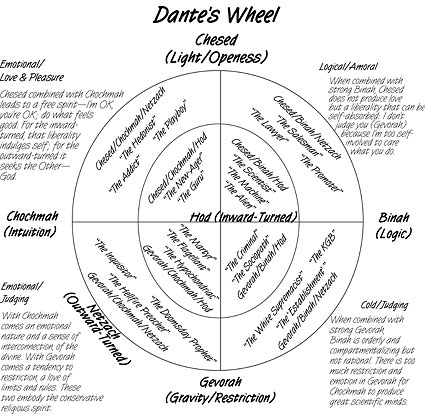Jane Jensen
Dante’s Equation
One finds, through a study of the implications of the quantum theory, that the analysis of a total system into a set of independently existent but interacting particles breaks down… the various particles [of physical matter] have to be taken literally as projections of a higher-dimensional reality which cannot be accounted for in terms of any force of interaction between them.
By looking into the microscope we peer at G-d. Science is the face of the Ein Sof.


Book One.
The One-minus-One
1
We are like Midas… Humans can never experience the true texture of quantum reality because everything we touch turns to matter.
1.1. Denton Wyle
Denton Wyle was seriously reexamining his choices. His fingers were wrapped like living clamps around a pole, his blond hair dribbled water down his patrician nose, and his back pressed hard against the cabin of the rescue ship as sea spray slapped him on the cheeks like an outraged Englishman and the deck beneath his feet pitched like a bucking bronco.
He was on a ship, in a storm, smack dab in the Bermuda Triangle.
The Coast Guard crewmen, bright orange specks in a wet, gray world, moved about the tilting slippery deck with ease. They were on a mission to locate a yacht, the Why Knot Now, in distress off the Florida Keys. A sailing advisory was in effect and the yacht, manned by a couple and their teenage daughter, had radioed that their compass appeared to be in error, because they were lost and didn’t know which way to go to find land.
It was the call Denton had been waiting for, hanging out in the Coast Guard station for weeks now, schmoozing with men who had sea salt in their eyebrows. A bad compass? A lost vessel? Denton Wyle, intrepid reporter for Mysterious World, was all over it.
Only now he realized, as his fingers spasmed from being clenched so tightly around the pole, that the two key words in this entire scenario were not bad compass or even Bermuda Triangle but sailing advisory. Sailing advisory meaning: “our advice is, don’t go out on a freaking ship.”
“Wyle?” A rain-soaked face in a blue hard hat appeared. It was Frank, a burly New Yorker. Denton had spent an afternoon watching him hose down nylon netting.
“Yeah?”
“Get. Inside. The cabin.” The words were shouted over the howl of the wind and symphonic crash of waves. Frank hung lightly with one hand to the pole just above Denton’s white knuckles. With the other he jabbed an index finger at the cabin behind them.
“I’m fine,” Denton shouted back, because moving anywhere meant letting go of the pole.
But Frank had been trained in dealing with the hapless. He grabbed Denton’s upper arm and pulled. Behind Frank the side of the rescue boat was tilted at a forty-five-degree angle, and its thin, insubstantial metal rail kept dipping in and out of churning water. Denton could so clearly imagine sliding into that maw if he let go, just like the scene from Jaws where the fishing boat captain slides down the deck into the shark’s mouth.
“Come on!” Frank yelled.
Denton let go. There was a panicked moment of sliding feet; then the cabin door was in his hand and Frank shoved him through, slamming the door behind him.
Inside, Denton stood panting, trying to get a firmer grip on his breakfast. He made no pretensions of bravery. The right stuff had been left out of hisgenetic code; he could admit that. But he was also not a boat person. Even growing up on the shores of Massachusetts, where yachting clubs got better attendance on Sundays than churches, he had not liked boats. What on earth had he been thinking?
He hadn’t been thinking about the Bermuda Triangle or the sea. He’d been thinking about woods, about a little girl and flashes of light.
The rain lashed the windows so hard you couldn’t see a thing on deck from inside the cabin, only great watery swells as they blocked out the sky.
“They keep fading in and out of radar,” one of the crewmen reported.
Captain Dodd looked from the window to the radar screen and back again, peering out with squinting eyes. “How far?”
“About five hundred meters.”
“Move closer. Slowly.” Dodd never took his eyes off that window.
Denton found this conversation curious enough to nudge awake his reporter’s instincts. He remembered the camera that had been flopping around on his chest for the past hour. He dried it with his sleeve and took some snapshots. It made him feel a little better.
“Damn it, we should have a visual by now!” Dodd stomped to a rack of gear and grabbed a rain poncho. “I’m goin’ out. I’ll send Johnson in to watch for my signal.”
The wind intensified as the door opened and closed. Denton moved in to get a tight shot of the radar screen. He didn’t recognize the operator, a baby-faced kid, no more than nineteen. He seemed amazingly unafraid, unfazed by the heaving deck beneath them or the towering waves above. He was intent on trying to tune in a better signal.
“Which blip is theirs?” Denton asked, teeth chattering.
The operator pointed to a faint ping, barely there. For a few seconds it went away; then it reappeared.
“We’re not sure that’s them, but we’re close to their last recorded position.” The kid looked up. “You okay?”
“Fine.”
“You look chalky.”
“I’m…” Denton glanced up and saw a gigantic wall of water. The wave slipped beneath them with a pitch and roll. “…fine. Look, does the radar usually do that? Fade in and out?”
The operator looked around, as if someone else could answer for him. “It’s not supposed to, but this is pretty bad weather.”
The wind blasted again as Johnson came in and took up a position by the window. Denton watched the blip disappear. This time, it didn’t come back.
And it didn’t come back.
He felt a rising sense of excitement at the sight of that dead screen. A headline was taking shape in his head: Coast Guard Witnesses Disappearance of Vessel on Radar in Bermuda Triangle. He took more pictures, struggled to see out the window.
Johnson held up a hand. “Starboard! Thirty degrees!”
The atmosphere in the cabin changed instantly from one of grim worry to confidence and competency. It was amazing what the willpower of man could do, Denton reflected, even in the face of something as elemental as this storm. The ship turned, the men shouting instructions, working as one. Their energy was so intense that for a moment he glimpsed what it would be like to be one of these boatmen, mastering the great watery tide.
There was a flash of another vessel in the window, but it disappeared in the rain and waves. Denton couldn’t see a damn thing in here. He had to go outside.
Now that the ship had turned, the deck was tilting the other way and Denton had no problem grabbing the pole from the cabin door. He clung to it, wrapping his legs around it like a pogo stick, and managed to bring up his camera. They were indeed approaching another ship.